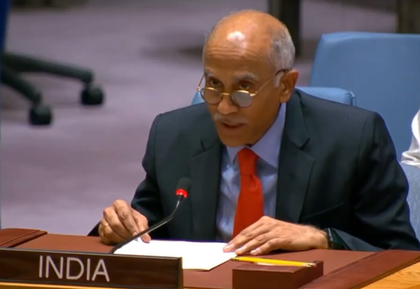Defending Op Sindoor, India cites UNSC statement on holding sponsors of Pahalgam terror accountable
By IANS | Updated: July 23, 2025 06:39 IST2025-07-23T06:32:19+5:302025-07-23T06:39:28+5:30
United Nations, July 23 Defending Operation Sindoor, India has cited the Security Council statement on holding sponsors of ...

Defending Op Sindoor, India cites UNSC statement on holding sponsors of Pahalgam terror accountable
United Nations, July 23 Defending Operation Sindoor, India has cited the Security Council statement on holding sponsors of Pahalgam attack accountable and said a “serious cost” must be imposed on those abetting cross-border terrorism.
India’s Permanent Representative P Harish said on Tuesday that New Delhi launched Operation Sindoor on the basis of the unanimous April 25 Security Council statement that underlined “the need to hold perpetrators, organisers, financiers and sponsors” of the Pahalgam attack accountable.
Operation Sindoor targeting terrorist camps in Pakistan and Pakistan-occupied Kashmir (PoK) “was focused, measured, and non-escalatory in nature”, he said.
Harish warned of terrorism changing the nature of international conflicts.
“The nature of conflicts has transformed, with a proliferation of non-state actors, often propped up as proxies by state actors; and cross-border funding, arms trafficking, training of terrorists, and spread of radical ideologies, facilitated by modern digital and communication technologies”, he said.
Earlier, Pakistan’s Deputy Prime Minister Mohammad Ishaq Dar, who presided over the Council's open debate, brought up Kashmir and India holding the Indus Water Treaty in abeyance.
As president of the Council for this month, Pakistan titled the debate, “Multilateralism and Peaceful Settlement of Disputes”, as a backdoor way to bring in the involvement of third parties, which India has rejected.
“Pakistan remains a firm believer in the promise and power of multilateralism”, he said.
The Council, he said, has failed to follow through on its resolution on Kashmir and “selective implementation of Council resolutions, double standards, and the politicisation of humanitarian principles have eroded its credibility and effectiveness”.
Resolution 47 on Kashmir, adopted in 1948, first requires Pakistan to withdraw its troops and citizens and stop aiding those fighting there.
Islamabad violates the resolution it cites often by continuing its occupation and supporting terrorism, making it moot, while Kashmiris have participated in elections affirming their link to India in the areas not occupied by it.
Dar said that the mechanisms outlined in the UN Charter’s Chapter VI on the pacific settlement of disputes “remain underutilised or selectively applied”.
But Harish pointed out that Chapter VI "begins by a recognition that it is the ‘parties to a dispute’ who must first of all seek a solution by peaceful means of their own choice”.
“National ownership and consent of parties are central to any efforts to achieve peaceful resolution of conflicts”, he added.
Harish also reminded the Council about the urgent need to reform it because of the “growing doubts about the multilateral system, especially the United Nations”.
“The serious question marks over the representativeness of the UN Security Council must be addressed urgently”, he said.
In making important international groups more representative, "India is proud to have facilitated the inclusion of African Union in the G-20 platform during its presidency”, he said.
Disclaimer: This post has been auto-published from an agency feed without any modifications to the text and has not been reviewed by an editor
Open in app